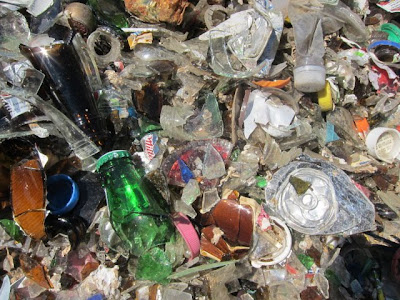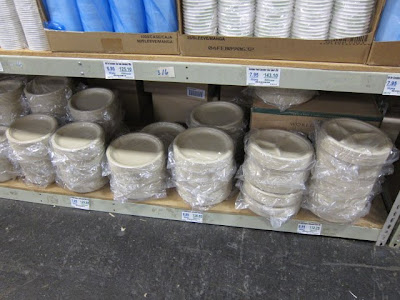
From a chance hook-up last month, I became the sustainability coordinator for the
YWCA's women's triathlon Sunday at Lake Nokomis. Before the race, I located a food shelf nearby to take leftover food, found local "carbon-offset"
options for racers, and gave advice on
renting organics carts from the city of Minneapolis. Then it was race day, which started with me getting there at 5 a.m.
This was my first time coordinating such a large event, so for the first hour or so, I ran around with the help of a couple of other volunteers setting up disposal stations. Usually I either a. show up and the disposal stations and signage are already in place or b. show up and set up my own disposal stations and signage but for a lot fewer people. The parks department was supposed to remove the big metal trash cans so that people would have to go to our disposal stations, which they did not do. And the cans were full of trash, which made them too heavy to lift and put off to the side so that people wouldn't see them. So I had to set up more disposal stations even though I was skeptical about being able to monitor them all (I was supposed to have 7 Green Team volunteers). As it turned out, the disposal stations we planned wouldn't have been enough -- there were too many people over too big an area.
My disposal station...

... was next to the food tent.

Lots of cardboard and boxboard recycled

Over the course of the day I became more and more overwhelmed. There were three main stations, and at least seven other smaller stations, and only about half of them were (wo)manned about half of the time (I only ever saw 2 of my 7 volunteers). And there were so many people that I couldn't shuttle between my main station and the other stations nearby. And if you leave your compost bin unwatched for any length of time, people start throwing non-compostables in, and pretty soon it all looks like garbage.
I felt increasingly helpless as I watched the mini-stations get contaminated. I just couldn't keep up. I began to wish I could just go home and go back to bed and leave the whole mess behind. And the three organics carts we rented weren't nearly enough -- seven would've been better. Since the city will only pick up what's in the carts, at the end of the race I was loading heavy bags (a lot of watermelon got eaten) of organics into my car, along with all the plastics, granola-bar wrappers, chip bags and my containers from home.
UltraGreen donated all the compostable plates, cups and utensils.

But in the end, a lot of the organics is going to get composted, and a lot of the bottles, cans, cardboard, boxboard and plastic bags are getting recycled. But a lot also got trashed. It was sad, and I felt so ineffective. As the lone dumpster-diver, I didn't stand a chance. Plus it was very windy, so the cardboard bins kept blowing over, and I spent a lot of time taping bags to cardboard bins, taping down signs, taping down granola-wrapper collection boxes.
I also neglected to take pictures of the overflowing trash bins, which were probably 95 percent compostable or recyclable. The sight of those bins made me feel so defeated.
UPLIFTING UPDATE: Race co-director Paul Johnson took all the bags of "trash" back to the Y to be sorted! The organics will get composted after all!! Hooray for his dedication and the efforts of the YWCA folks to go green!!
Water station with compostable cups. I LOVED THIS!

Trash at my station

2 bags of organics + 2 cartfuls at my station (it was closest to the food tent)

Lessons learned:
1. No way can you compost at such a big event without plenty of volunteers dedicated to manning a disposal station. This is a very important lesson for me because I've been eager to compost at some of the big summer events, such as the Uptown Art Fair, which gets about 350,000 people over 3 days.
2. Rent more carts. (but at the Lynnhurst Festival this past Wednesday we overestimated and only needed 3 of the 4 carts)
3. Go to the site ahead of time to get a feel for the layout. (don't know if this would've been possible since I entered the scene so late in the game, and the race director had about 800 things to do at that point.)
Positives:
1. We got the ball rolling, which often is the most difficult step. Next year things will be better prepared.
2. I got a lot of enthusiastic, positive comments from triathlon participants. They loved the low-waste efforts.

























































